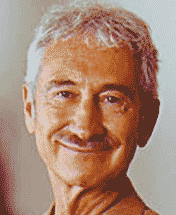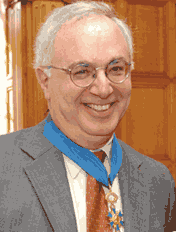
 |
||
The Yale Alumni Magazine is owned and operated by Yale Alumni Publications, Inc., a nonprofit corporation independent of Yale University. The content of the magazine and its website is the responsibility of the editors and does not necessarily reflect the views of Yale or its officers. |
For Frederick John Lamp ’82PhD—Yale’s first-ever curator of African art—the wood and metal objects he studies aren’t just things to hang on a wall. “The objects we see in museums are fragments of a larger art form,” says Lamp, who in January became the Frances and Benjamin Benenson Foundation Curator of African Art at the Art Gallery. Lamp first came to Yale to study under the renowned art history professor Robert Thompson Jr. '55, '65PhD, and he shares Thompson’s interest in the dances, movements, and rituals that form the larger context in which the art was used. Lamp, who has been a curator at the Baltimore Museum of Art since he turned in his Yale dissertation in 1981, has focused his own research on the art of Guinea and Sierra Leone, with a special interest in the art and ceremony of boys' initiation rituals. In the 1980s, he witnessed and documented the revival of the Baga culture of Guinea, whose rituals had been banned by the government and nearly lost. Lamp is planning a permanent exhibition of African art at Yale, which will be installed for the reopening of the Art Gallery’s main building after renovations are completed in 2006. He will also have the pleasure of sorting through the 800 pieces of art that real estate executive Charles Benenson '33 bequeathed to Yale before his death in February. (Benenson endowed Lamp’s position and named it for his parents.) “It’s one of the finest private collections in the country,” says Lamp of the Benenson gift. “It positions the Yale Art Gallery among the top museum collections in the country in African art.” Ian Shapiro '83PhD, '87JD, has been appointed the Henry R. Luce Director of the Yale Center for International and Area Studies. Shapiro, the William R. Kenan Jr. Professor of Political Science, is currently chair of the political science department. He also chaired the working group on social and international studies for the Committee on Yale College Education. At YCIAS, he succeeds Gus Ranis, who has directed the center since 1996. Alfred Guy Jr. will be the first director of the center for writing instruction in Yale College. Guy, who is currently director of expository writing at Johns Hopkins University, will oversee existing and new writing programs, including a requirement that undergraduates complete at least two courses that give attention to the development of writing skills. Louise Gluck, the current poet laureate of the United States, has been appointed the Rozenkranz Writer-in-Residence in Yale College. Gluck, who has taught at Williams College for 20 years, will teach courses and workshops to undergraduates during her five-year renewable term. Gluck won the Pulitzer Prize in 1993 for her book The Wild Iris and Yale’s Bollingen Prize for Poetry in 2001. Honored
Bruce Ackerman '67LLB, the Sterling Professor of Law and Political Science, has been awarded the Insignia of Commander of the French Order of Merit for his academic work in political science, history, and constitutional law. Established by General de Gaulle in 1963, the award is given by the French president for distinguished merit and is second only to the Legion of Honor. Zaha Hadid, who is teaching this year at the School of Architecture as the Eero Saarinen Visiting Professor, will receive the Pritzker Architecture Prize on May 31 in St. Petersburg, Russia. Hadid is the first woman to win the prize that is widely considered to be architecture’s highest honor. The Pritzker jury commended “a certain fearlessness” in her avant-garde forms. Remembered John Rodgers '44PhD, the Silliman Professor of Geology emeritus, died on March 7 at his home in Hamden at the age of 89. Rodgers, who had taught at Yale since 1946, was best known for mapping the bedrock geology of Connecticut. His 1970 study of the Appalachian Mountains, which he said were part of a range extending into South America, Europe, and Africa, helped substantiate the theory of continental drift. Robert Shope, a leading virologist and an emeritus professor at the School of Medicine, died on January 19 at the age of 74 in Galveston, Texas. Shope served on the faculty of the Department of Epidemiology and Public Health for 30 years and directed the Yale Arbovirus Research Unit before retiring in 1995 and taking a post at the University of Texas Medical Branch. In 1992, he authored a National Academy of Sciences report warning of the potential for new infectious-disease epidemics. |
|
|
|
|
|
|
|
|
©1992–2012, Yale Alumni Publications, Inc. All rights reserved. Yale Alumni Magazine, P.O. Box 1905, New Haven, CT 06509-1905, USA. yam@yale.edu |
||

